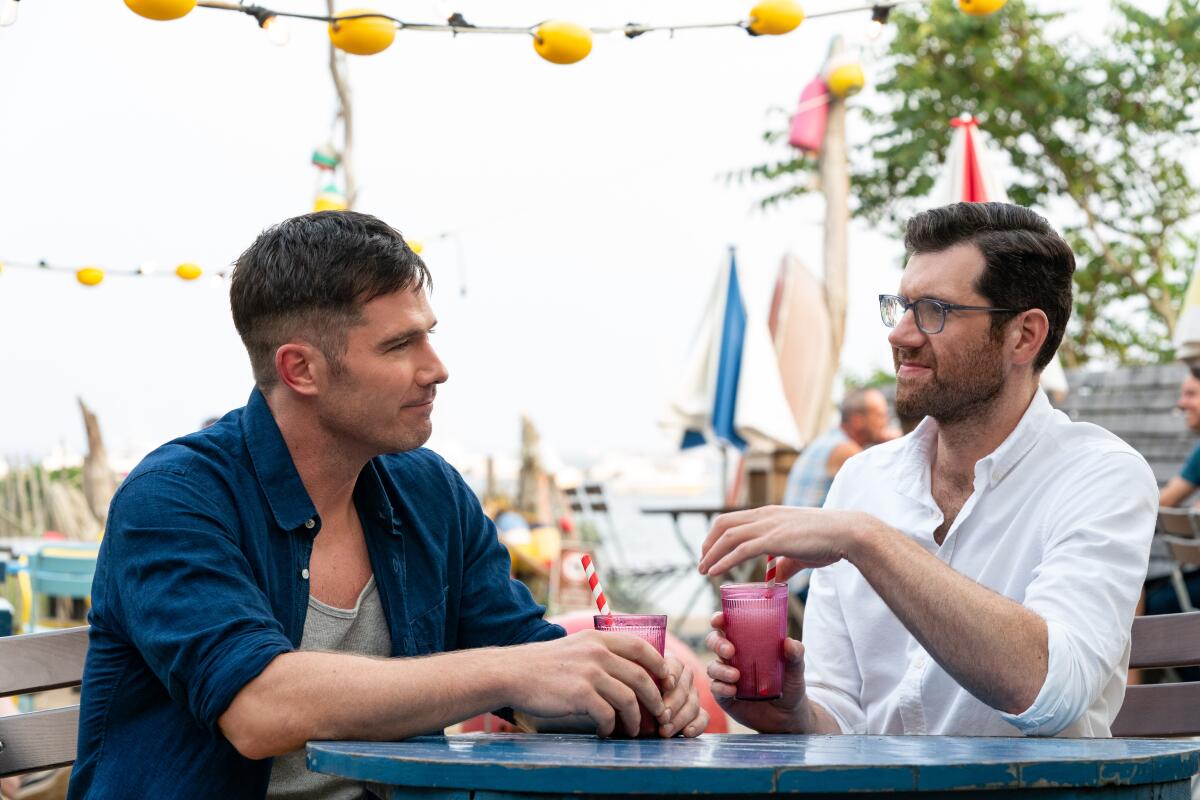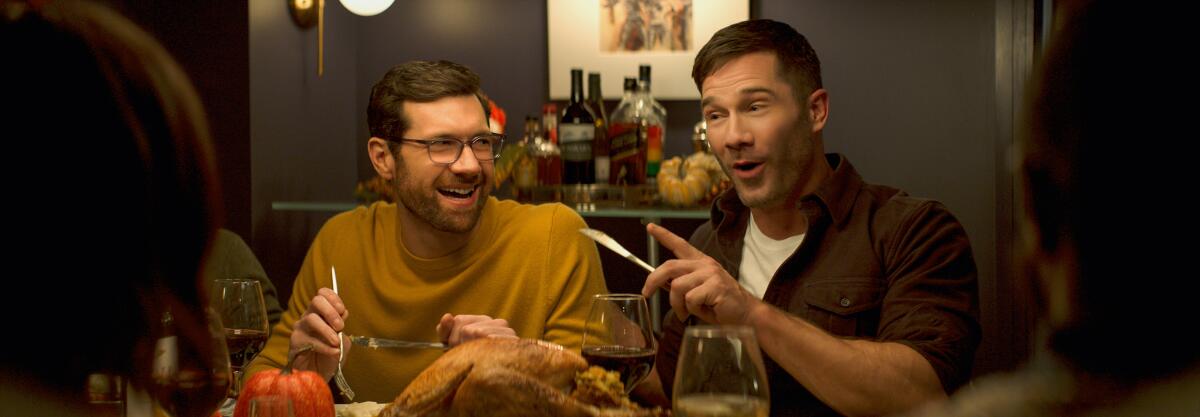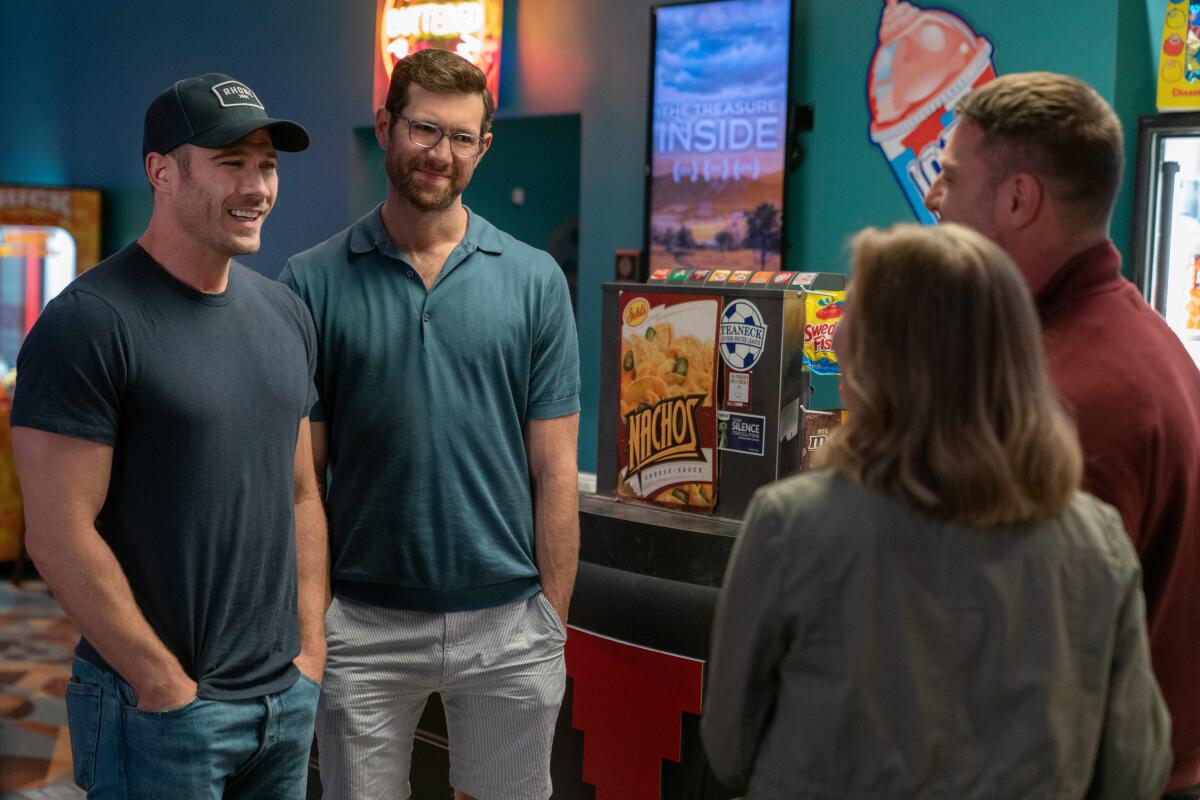Smart, self-aware laughs are among the pros of ‘Bros’

- Share via
At the beginning of “Bros,” a popular podcaster named Bobby (Billy Eichner) tells his listeners that he was recently asked for feedback on a gay romantic comedy — one that was pitched to him as a sweet, funny, accessible movie that would appeal to straight and gay audiences alike. But Bobby, outspoken on most topics in general and LGBTQ representation in particular, blanches at the notion that there’s anything “alike” about it. Gay and straight experiences aren’t interchangeable, he says, and it’s ridiculous to expect the former to conform to Hollywood’s monogamy-minded feel-good imperatives.
“Love is not love,” Bobby declares, demolishing a common bit of throw-pillow wisdom and setting “Bros” itself a pretty tricky challenge. This movie knows precisely what it is — a rare same-sex romantic comedy released by a major studio — and as such, it also knows it’s duty-bound to both challenge and uphold certain conventions. It must thumb its nose at what Bobby dismisses as staid heteronormative ideals (monogamy, marriage, etc.) while still giving us a couple worth rooting for beyond the length of a four-way orgy, to name one (actually two) of the movie’s bawdier set pieces.
For your safety
The Times is committed to reviewing theatrical film releases during the COVID-19 pandemic. Because moviegoing carries risks during this time, we remind readers to follow health and safety guidelines as outlined by the CDC and local health officials.
That’s a tough needle to thread, and you could accuse “Bros” of trying to preempt some of its own criticism. This movie, which Eichner co-wrote with Nicholas Stoller, talks a pretty good game, but it also hopes you’ll be sufficiently disarmed by its scabrous wit and R-rated, slap-happy sex scenes to forgive — and maybe even love — its final swerve into happily-ever-after uplift. It’s hardly a spoiler to note that Bobby will soon meet the man of his dreams, or that this (yes) sweet, funny and accessible movie means to send them and the viewer home in a good mood.
That it succeeds as well as it does can be chalked up to a lot of different things, including the pleasures of Provincetown in the fall, the sights of New York at Christmastime and the unerring perfection of Luke Macfarlane’s five o’clock shadow. Macfarlane plays Aaron, the baseball-capped Adonis whose ripped physique catches Bobby’s eye one night across a crowded dance floor. They’re at a launch party for a gay dating app (the name of which alone is worth the price of admission), though neither Bobby nor Aaron is really looking for action, let alone something more serious. Still, there’s a prickly opposites-attract energy to their first encounter, one that deepens after they get past a few awkward text exchanges and start hanging out.

Even so, the relationship — one of a few words they’re reluctant to use — requires more than a few adjustments. Aaron, dismissed by a mutual friend as “very hot and very boring,” initially seems attracted to uncomplicated hunky types like himself, including a recently uncloseted high-school buddy, Josh (Ryan Faucett), who pops up every so often to complicate the plot and inflame Bobby’s jealousy. And to Bobby’s particular horror, Aaron’s entertainment tastes run toward “The Hangover” and Garth Brooks; he has no idea who Debra Messing is.
He’ll eventually find out, since Messing has the most extended of several amusing cameos in a movie that worships, mocks and sometimes casts a slew of LGBTQ audience favorites. Pop-culture wisecrackery is of course a staple of mainstream romantic comedies, especially those that hail, like this one, from the Judd Apatow stable. (This is the latest Apatow production directed by Stoller, whose earlier credits include “The Five-Year Engagement” and “Forgetting Sarah Marshall.”) But the movie, taking its cues from Bobby’s expertise, moves past breezy Apatovian allusiveness into a realm of media criticism as snarky as it is scholarly.
There are jokes about a TV network’s cynical explosion of queer-themed output (“A Holly, Poly Christmas” is one of the better ones) and affectionate eye rolls at the sanitized, sentimentalized depictions of gay men on “Queer Eye for the Straight Guy” and “Schitt’s Creek.” There are also jabs at prestige dramas like “Brokeback Mountain” and “Milk,” mainly for their Oscar-friendly practice of casting straight actors as gay characters destined for tragedy.
“Bros,” which has little use for straight actors (or tragedy), sets itself up as a meaningful corrective. Though hardly the only gay romantic comedy of note to emerge in recent months (like Hulu’s “Fire Island,” whose Bowen Yang pops up here as a lofty Provincetown millionaire), it does boast the notable big-studio precedent of an entirely LGBTQ principal cast, albeit one whose racial and sexual diversity happens to prop up a love story between two white, cisgender, gay men — something the movie acknowledges with both a wink and a wince.

Bobby, for his part, is well aware of his privilege, which he vigorously mocks on his podcast and tries to keep in check while serving on the board of a soon-to-open LGBTQ history museum, the first such institution in New York City or anywhere in America. He’s spent most of his professional life thinking about and advocating for queer visibility, which makes him a shrewd if convenient protagonist for a movie with some of the same concerns. He wants to educate straight people whose knowledge of queer history begins and ends with AIDS and Stonewall, and also to jolt his overly complacent LGBTQ peers into a more vigilant state of allyship.
Which brings us back to Aaron, who’s generally been content to go with the flow, drifting through his lucrative, unsatisfying career as a probate lawyer and his relationships with his mild-mannered family. Aaron is open about his sexuality, but he maintains a steady commitment to not rocking the boat — unlike Bobby, who’s intent on capsizing the damn thing. The roots of Bobby’s defiance are laid bare in a beautifully written and acted beachside monologue in which he talks about having been instructed all his life to constrain his queerness, by everyone from bigoted authority figures to his own supportive, identity-affirming parents. His refusal to compromise any longer is, for Aaron, a challenge, an eye-opener and a source of genuine admiration.
Aaron challenges Bobby in similarly valuable ways. Easily dismissed as, in Bobby’s words, a “big, bro-y meathead idiot,” he’s a reminder that smart, emotionally perceptive people don’t always announce their virtues or their values through a megaphone. Watching these two men realize their mutual Mr. Rightness is the chief pleasure of “Bros,” especially since Macfarlane, with his easygoing vibes and puppy-dog eyes, makes such a natural foil for Eichner’s unbridled exuberance. At times Bobby suggests a cross between two of Eichner’s better-known roles, merging the hyper-eloquent comic belligerence of “Parks and Recreation’s” Craig Middlebrook with the singing chops of “The Lion King’s” Timon the meerkat.
It would be unreasonable to expect the movie’s various second bananas to be nearly as well drawn, though I do wish that “Bros” didn’t treat them quite so flippantly. Bobby’s bickersome museum colleagues sometimes make up a charmingly intersectional peanut gallery and sometimes feel like an assortment of tokenizing punchlines. Dot-Marie Jones plays a physically imposing lesbian, Jim Rash plays a snippy bisexual and Miss Lawrence plays a gender-nonconforming person who cultivates a Zen-like serenity. They’re reminders, perhaps, of the folly of trying to make a movie that will represent or satisfy everyone. Which doesn’t mean that they, and “Bros,” don’t make for enjoyable company.
‘Bros’
Rated: R, for strong sexual content, language throughout and some drug use
Running time: 1 hour, 55 minutes
Playing: Starts Sept. 30 in general release
More to Read
Only good movies
Get the Indie Focus newsletter, Mark Olsen's weekly guide to the world of cinema.
You may occasionally receive promotional content from the Los Angeles Times.











